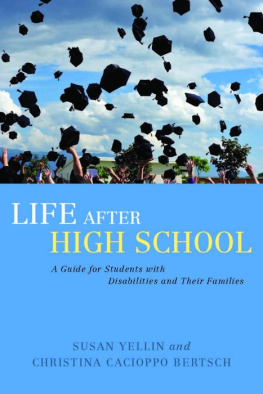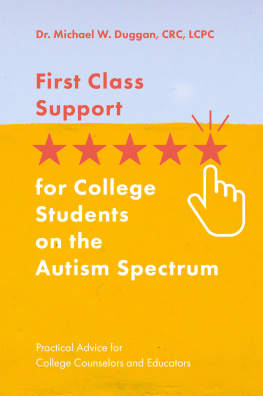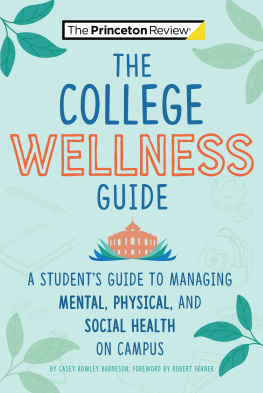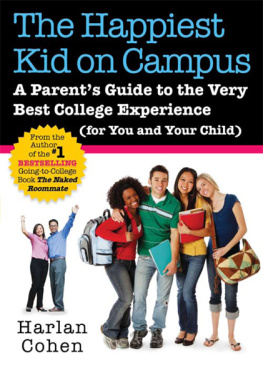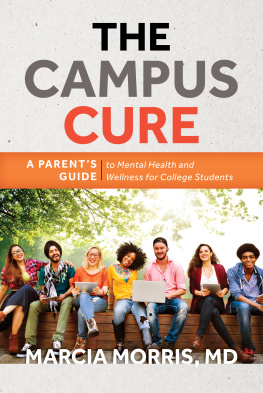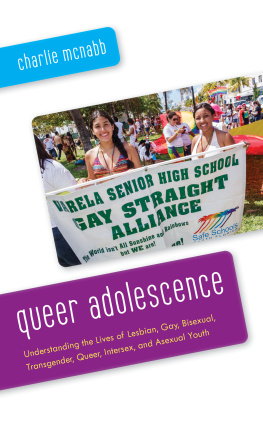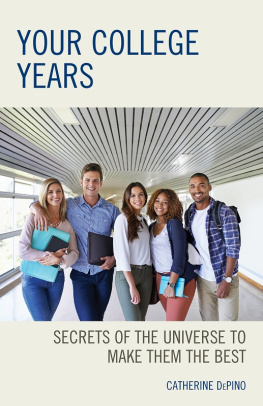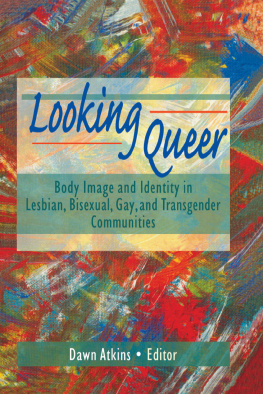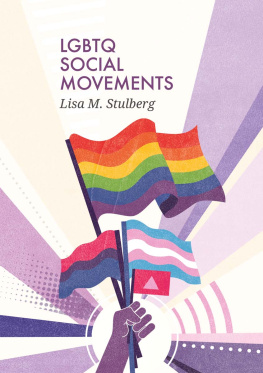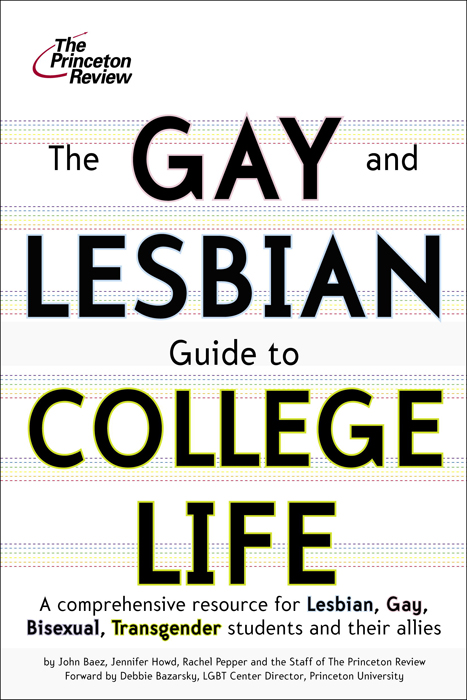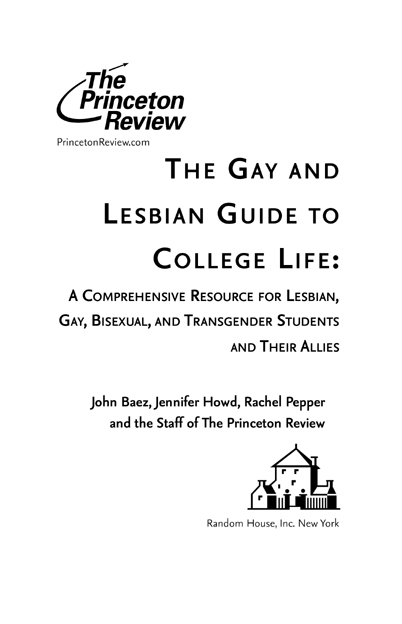The Princeton Review, Inc.
2315 Broadway
New York, NY 10024
E-mail:
2007 by The Princeton Review, Inc.
The Princeton Review is not affiliated with Princeton University.
All rights reserved. Published in the United States by Random House, Inc., New York, and simultaneously in Canada by Random House of Canada Limited, Toronto.
eISBN: 978-0-307-94501-3
Publisher: Robert Franek
Editor: Adrinda Kelly
Designer and Production Manager: Scott Harris
Production Editor: Christine LaRubio
Cover design by Sophie Ye Chin
v3.1
FOREWORD
LGBTQ student life has burgeoned with an increase in programming, support services, and visibility on college campuses nationwide. The face and experience of LGBTQ college students is dramatically different than it was tenor even fiveyears ago, which is what gives space and interest for a book such as this. In 1997, Ellen DeGeneres came out on national television to the great controversy of companies pulling advertisements, people condemning her, and the show being canceled. Today there are numerous gay and lesbian characters on television, and the controversy seems like a distant memory for those entering college today.
So, who are todays college students? For the majority of their lives, they have always known out characters on television; they have been aware of out musicians, athletes, and politicians. They have only known the same-sex marriage debate as one over civil unions, marriage, and domestic partnership (versus no rights at all); they have gay/straight alliances in their high schools and friends, as well as family members, who are out. They have numerous examples of ways to be queer in an incredibly diverse community with a growing openness to a wide range of labels and flexibility of identity; and some have been out since childhood, with no memory of the closet in the same ways it has been constructed in the past.
In what sociologist Steven Seidman refers to as the post-closet era, LGBTQ college students come to the table with a different outlook on college life than those who paved the way before them. In addition, straight students have grown up with many of these same experiences and arrive at college with openness and understanding for their LGBTQ peers. With allies showing greater support and involvement and a larger number of out LGBTQ students, life on campus is increasingly open and integrated.
Support services for LGBTQ students have also dramatically changed. Eighteen years ago, there were eight schools with LGBTQ offices. Now there are over 100, and they range from small private colleges to large public universities in over 36 states and several provinces in Canada. LGBTQ offices provide a home and community for students on campus. These centers offer programming, advising, support, and advocacy and give students the space to explore their identities, gain leadership opportunities, and have a better overall college experience.
In addition, most colleges and universities have at least one, and sometimes many, LGBTQ student organizations. Increasingly, schools are offering support and social groups for LGBTQ students of color, transgender and genderqueer students, LGBTQ athletes, bi and fluid students, and many others. Also, many schools offer regular programming for LGBTQ students through student life and academic departments. Notably, some schools support students through their multicultural office, womens center, or student activities offices. These are all things to keep an eye on during your college search.
Whether you are in rural Tennessee, a large city in Ohio, the Southwest, or anywhere in between, being LGBTQ, you are likely considering college with an additional layer of concerns and expectations. Throughout the book there are numerous references to LGBTQ centers and resources; however, a vast majority of schools do not have this level of support, and at these universities there are often amazing students like you who are challenging the system, advocating for more rights, and building support from the ground up. There are also LGBTQ students at schools that have a plethora of resources and vibrant communities who still feel like they are the only ones, fear rejection, and worry about being misunderstood or misrepresented. As much as things have changed, there are still challenges to being out in college and a need for more resources to help students like you in the journey of LGBTQ identity exploration.
Parents and students alike are factoring LGBTQ issues into their selection of colleges and universities, and if you are picking up this book, you probably are too. For prospective LGBTQ students, this book has numerous suggestions about how to find community, be safe, and have fun during your undergraduate years. From navigating the residence halls to finding the right summer internship, this book can be a resource for you to help make the most of your college experience. For parents and guidance counselors, this is a great place to start thinking about ways to offer support for LGBTQ college students, as well as figuring out how to guide them through the college experience. There are numerous quotes from parents throughout this book that offer insights into what their experiences have been. Take the resources here, but also reach out to other parents and students, either online or in person, to learn how they have dealt with the transition to college life.
College is a time of great transition and growth. It is a time when many LGBTQ students begin to understand their identities in deeper and more holistic ways. Looking for the right fit and making the most out your LGBTQ experience is important. This book will help you think about some of the things you should be considering, as well as some of the important questions you should be asking. College is a great time to find your way and your place in the LGBTQ community both on your campus and on the national stage. There are so many different ways to engage with LGBTQ life on campus today. Have fun with the process and good luck with your inqueeries!
Debbie Bazarsky serves on the Executive Board of the National Consortium of Directors of LGBT Resources in Higher Education and is the Lesbian, Gay, Bisexual, Transgender Center Director at Princeton University.
Steven Seidman. Beyond the Closet: The Transformation of Gay and Lesbian Life. New York: Routledge, 2004.
CONTENTS
A MESSAGE FROM J UDY S HEPARD, OF THE M ATTHEW S HEPARD F OUNDATION
Speaking to college audiences is one of the most gratifying parts of the work I do on behalf of the Matthew Shepard Foundation. The foundation seeks to Replace Hate with Understanding, Compassion, and Acceptance through its varied educational, outreach, and advocacy programs, and by continuing to tell Matthews story. Encouraging young people to get involved in the political process is an essential element in making that change. College and university campuses are the ideal locations to do this work.
I am invited to a variety of schoolsbig, small, religious, conservative, progressive, and every type of institution of higher learning in between. Being a witness to collegiate activism has been informative from a work standpoint, and, at the same time, has helped me grow as an activist. I dont have a crystal ball, but from what I am seeing on campuses, this country is moving forward, and it gives me immense hope for the future of the lesbian, gay, bisexual, transgender, queer, and/or questioning (LGBTQ) community.


